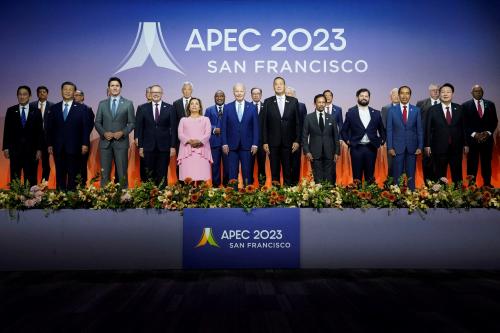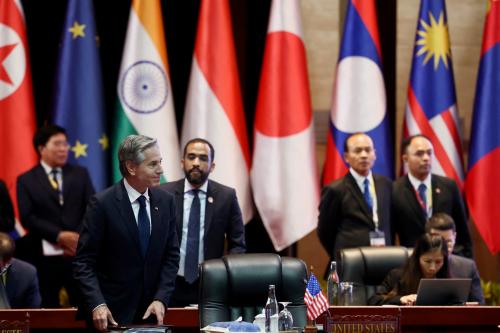During President Bush’s travels in Europe this week he will find that the major policy differences that divided Europe and the United States remain as stark today as they were during his trip in June. Europe wants the United States to continue abiding by the ABM Treaty barring deployment of missile defenses and to bring the Kyoto protocol on reducing greenhouse gases into effect; the Bush administration has said the ABM Treaty is a “relic” that does not serve U.S. security or world peace and declared Kyoto “fatally flawed.”
Neither Mr. Bush nor European leaders have given any indication that they are prepared to compromise on these issues, and so there is no real reason to believe that these differences will soon be bridged.
These significant policy differences and the apparent unwillingness to compromise are symptomatic of a fundamental shift in U.S.-European relations over the past decade. The reality is that the transatlantic partners today mean less to each other than they once did, and their interests and priorities are diverging.
Over the past 10 years, the nature of U.S.-European relations has shifted for several reasons: The unifying threat of the Soviet Union is gone; the United States has become the most powerful country in the history of the world; and the European Union is emerging as an international actor in its own right.
These changes have resulted in different foreign policy priorities, different foreign policy agendas, and different foreign policy styles across the Atlantic.
For the remainder of this decade, the first priority of every European government is Europe itself. Attention will be focused on consolidating recent gains in European integration (notably in the monetary and defense policy realm) and on preparing for the European Union’s enlargement to 25 or more states.
While Europe is looking inward, Washington is shifting its focus from the Atlantic to the Pacific, where the rising power of China and the proliferation of nuclear arms and other weapons of mass destruction now challenge U.S. security interests most directly. This shift is apparent in the Bush administration’s emerging defense policy. The push for missile defenses is driven in large part by the perceived threat from North Korea and, for many missile defense advocates, from China as well. And the Pentagon’s much-vaunted defense review is poised to conclude that the focus of America’s defense resources and policy should concentrate squarely on Asia, not Europe.
The diverging regional priorities of the United States and Europe are mirrored in their different foreign policy agendas. For Washington, the top foreign policy priority is dealing with what many perceive as the growing U.S. vulnerability to new military and security threats including weapons proliferation, “rogue states,” terrorists and cyber-attack.
None of these new threats resonates much in Europe. For Europeans, the more immediate concerns are food safety and containing the spread of infectious diseases more generally. The major foreign policy challenges are global—climate change, poverty, immigration, the trafficking in women and children and the “digital divide.”
While the United States is worried about rogue states, Europe is worried about failed states, nations whose troubles spread across borders.
It is not surprising, then, that the United States and Europe approach international engagement in very different ways. For the United States, because the primary concern is security, foreign engagement tends to stress the use of American military power. And because of its unique position of power in the world, Washington increasingly acts in ways that seem to have little regard for the position of others – and often gets away with it.
Going it alone is not the European way. Europeans put their faith in international institutions, treaties, and norms, often to the exclusion of using power as a means to achieve their desired objectives. Part of the commitment to a multilateral approach reflects that only together can Europeans get their way. But part is also due to the fact that Europe’s experience, in the EU as elsewhere, gives reason to believe cooperative and multilateral approaches often work best to solve common problems.
This clash of approaches between a United States bent on achieving its way and a Europe devoted to negotiating and adhering to treaties is, in fact, at the heart of the most recent disputes over global warming and missile defenses. And given the Bush administration’s open disdain for many international treaties and constraints – from ABM and the nuclear test ban to Kyoto and the international criminal court – there is little reason to believe that these differences will not get worse in the months and years to come.
While devoted Atlanticists will deplore the drifting apart of the U.S.-Europe alliance, we should recognize that it is happening, in part, for a good reason. Europe today is more secure, more peaceful, more united and more democratic than it has ever been. Under these circumstances, an American presence in, and attention to, Europe is both less likely and less necessary.
The U.S.-European relationship is slowly but surely maturing. The two sides are not equal, and most likely never will be. Nor are they ever likely to become political, let alone military, competitors. Too many ties still bind the United States and Europe for anything like that to happen.
However, as time goes by, they will need each other less and less, and act more and more independently. That may be a normal part of growing up. The challenge will be to devise new modes of interaction that take account of that reality.



Commentary
Op-edWidening the Gap: Policy Concerns of U.S., Europe Steadily Diverging
July 20, 2001